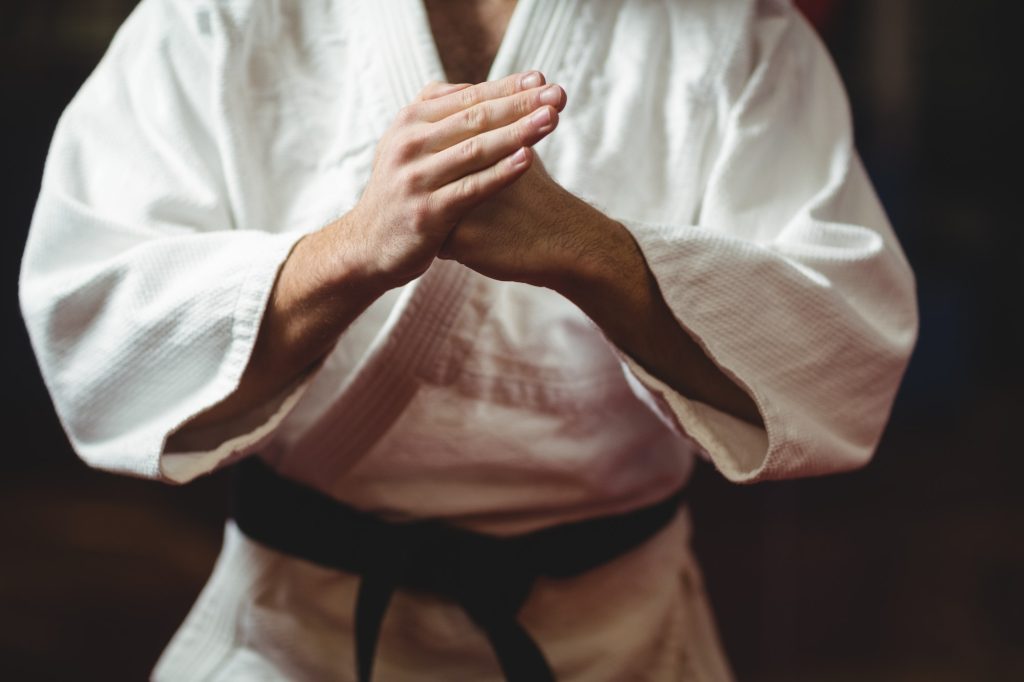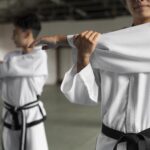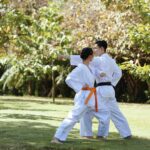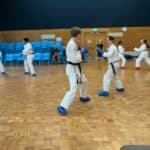Introduction – Karate Training Tips
For the seasoned karate practitioner, high-level performance requires much more than physical fitness and basic techniques, discipline, refined skill, and deep understanding. Whatever your objective, whether it is a higher rank or to perfect your skills, there are several ways you can improve your performance in karate. This blog looks at advanced strategies to help take your karate to the next level.
1. Know the Basics Correctly
Advanced practitioners sometimes think they must spend their time only on complicated techniques and that the basics are below them. The masters insist, however, that advanced techniques rest on stances, strikes, and blocks polished in the basic techniques. Sometimes, a slight adjustment in the placement of a foot or the rotation of a hip significantly affects a strike’s power, speed, and precision. Set aside time regularly to work on your fundamentals, critiquing even the tiniest detail of movement for inefficiency. The better you perfect your basics, the better complex techniques will flow.
2. Add Mental Training
Karate is a mental sport as much as it is a physical one. Cognitive training will help you develop better focus, reaction times, and resilience under pressure- all crucial things for an advanced practitioner. This technique is effective: mentally going through moves and sequences to set in muscle memory and confidence. Visualize everything in great detail: the angle of your body, weight in movements, and precision in strikes. Techniques rehearsed in one’s mind create neural patterns that make it easier to perform those very actions when the real opportunity comes along.
Mindfulness and meditation can also heighten your mental clarity, making things easier to handle in any situation, even under tense pressure. For instance, this would involve breathing exercises to help keep your heart rate down while managing your stress levels so that your head stays clear when fighting sparring. This form of mental clarity will be an excellent asset for you to capitalize on in furthering your work in karate.
3. Body Conditioning and Strength Training
In karate, you will need plenty of body conditioning. Advanced practitioners must undergo specific strength training, agility exercises, and flexibility routines that complement the movements in karate. The stronger the muscles, the stronger the strike or kick; similarly, flexibility reduces the chances of injury and allows more range. Core strengthening is necessary; a strong core provides stability and power to your techniques. Exercises like planks, Russian twists, and leg raises are some ways to build the core strength one needs.
Besides, powerful kicks and stances would only be possible with strength in the lower body. Lunges, squats, and calf raises add balance, strength, and endurance. Add plyometric exercises such as box jumps or ladder drills to increase your speed and reaction time for agility. Body conditioning improves your general performance and protects you from injury, adding longevity to your advanced training.
4. Refine Your Timing and Distance
In advanced karate, timing and distance mean everything when performing techniques well. It allows you to avoid the attack, move closer to your opponent, and precisely strike your target. Sparring will help polish one’s timing and distance a lot. When sparring, keep a keen eye on your opponent’s movements and adjust your position so that you can make openings.
Other helpful exercises include shadowboxing, where you can visualize your imaginary opponent and practice keeping the optimum distance and timing without a partner. Training with various partners will also help you learn to adapt to different fighting styles, which will continue to help you master your control over timing and distance in an actual fight.

5. Improve Your Reaction Speed
These fast reaction times can be critical, as sparring and competition are physically heated events. To improve your reaction speed, practice drills that imitate real-life combat situations. One of these drills can include a partner making an arbitrary attack that would make you block, evade, or counter out of automatic response rather than anticipation. Reaction balls provide ground for unpredictable bounces and can train your reflexes and coordination.
Add some quick ladder footwork drills into your regimen that will dramatically challenge you to change direction. The more you practice these, the faster your reaction will be to respond during sparring.
6. Study Advanced Kata
Generally, novices perform katas, but advanced-level katas become sophisticated and provide greater insight into the principles. In advanced kata, the body movements are complex, techniques succeed one another, and katas are advanced to test balance and precision. Each kata possesses a rhythm and application of power particular to itself, making it a tool of great use in refining skills.
Advanced katas should be approached not as isolated moves but as one fluid motion of energy, paying great attention to transitions, breathing, and rhythm. In such a way, you get smoothness, control, and a deeper understanding of the techniques included in katas from deep training. Katas teach you to be focused and not lose a single movement needlessly, which you need in sparring.
7. Get the Feel from Instructor’s and Peers’ Feedback
No matter how advanced you are, there is always room to improve, and you can get feedback to refine your technique further. Find yourself an experienced instructor who can notice small areas of improvement in your movements that you need to learn of and give individualized advice. Of course, practising in front of a mirror is helpful, but sometimes feedback from outside sources is the most important, as it helps you notice things you might not have otherwise.
Engaging in partner drills and sparring with peers also allows for learning from others. Every practitioner has strengths and ways of doing things, and watching how others perform techniques might give you new perspectives on your training.
8. Set Goals and Track Your Progress
As you progress in karate, well-defined and achievable goals ensure motivation and enable you to gauge the level of your progress over time. Give up general goals like “improve sparring” and opt for a concrete objective like “increase the speed of kicks” or “perfect kata transitions.” When you set defined goals for yourself, you know where you are heading and how you are progressing towards reaching that goal.
Specifically, it is beneficial to maintain a training diary in which you note struggles and successes experienced and where and how improvement is needed. The ability to look back and reflect on where you have been and how you have felt will continue to motivate you to strive to attain new heights constantly. You will feel accomplished as you work through your journey, which will help you remain committed to your progress in karate.
Conclusion
It takes dedication, refinement of basic skills, and attention to both mental and physical conditioning to achieve an advanced level in karate. These few tips on karate training can go a long way in improving your practice, be it in the way of body conditioning, mental training, or how to work with timing and distance. With these advanced strategies, you can break through barriers that hold you back from improving and give a whole new meaning to your experience in karate. Karate is a long journey of learning and growth; remember that with discipline, it will continuously refine and, in due course, perfect your art.












